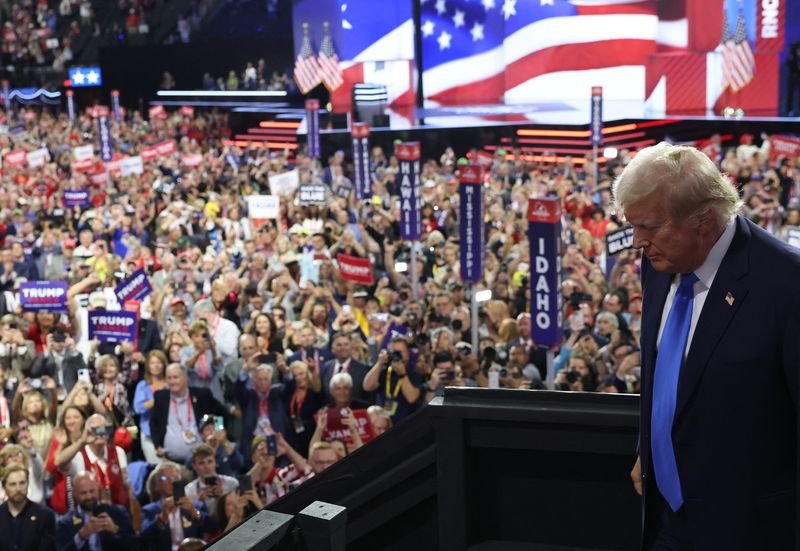By Saqib Iqbal Ahmed and Davide Barbuscia
(Reuters) – Rising expectations that former President Donald Trump will regain the White House in November are supercharging the so-called Trump trade, on views that his policies will lift corporate profits even while spurring worries about the country’s long-term fiscal health.
The two sides of the trade have been evident in recent weeks, as investors price in greater odds of a win by the Republican challenger following a disastrous performance by President Joe Biden in a late June debate and after last weekend’s assassination attempt on Trump.
Stock investors are leaning into corners of the U.S. equity market that could benefit from proposed Trump policies such as tax cuts and regulatory easing, including small caps and energy shares. Those preferences – along with expectations that the Federal Reserve will cut interest rates in coming months – are fueling a rotation out of big technology stocks and into less-loved areas of the market.
Treasury markets tell a different side of the story, with some investors lightening positions in longer-dated bonds as they fret about the fiscal consequences of lower tax revenues and more budget spending. UK merchant banking firm Close Brothers estimated that a second Trump term could usher in from $4 trillion to $5 trillion of extra government borrowing over 10 years, potentially boosting inflation and weighing on bond prices.
Many investors believe monetary policy and corporate profits will ultimately overshadow politics as long-term drivers for asset prices, while much could change in the less than four months until election day. Nevertheless, the recent moves give a glimpse into how markets are approaching the possibility of a second Trump term.
“The market is saying that the expectation is that there is going to be a second Trump presidency,” said JJ Kinahan, CEO of IG North America and president of online broker tastytrade. “The probabilities are all pointing that way.”
RISING ODDS, RISING STOCKS
Online prediction site PredictIt on Tuesday showed bets of an election win at 69 cents for Trump, compared with 53 cents a month ago. Biden stood at 28 cents, compared with 44 cents in mid-June. A two-day Reuters/Ipsos poll that closed Tuesday found Trump opening a marginal lead among registered voters – 43% to 41% – over Biden.
The rising odds have been accompanied by a rally in everything from small caps to shares of crypto companies. Beneficiaries include private prison operator Geo Group, whose shares have risen 33% since the debate in late June. Trump promised to crack down on illegal immigration, which could boost demand for detention centers.
Bitcoin miner Riot Platforms is up 30% this week, mirroring a rally in the price of bitcoin following the assassination attempt on Trump, who has slammed Democrats’ attempts to regulate the crypto sector.
The small-cap-focused Russell 2000 index is up 11% since the debate, as expectations that Trump will keep taxes low and bets that the Fed will cut interest rates in September boost the appeal of smaller companies. The S&P 500, by contrast, is up just 3.4% in that period.
“The Trump trade … revolves around the prospect of faster economic growth that favors domestic companies,” said Brian Jacobsen, chief economist at Annex Wealth Management.
King Lip, chief strategist at BakerAvenue Wealth Management, said his firm has been holding a limited position in small-cap stocks as a hedge for a Trump victory.
Robert Christian, chief investment officer at K2 Advisors, which invests in hedge funds, said many hedge funds have positioned for a Trump win with increased exposure to energy companies and financials, which they believe could benefit from a looser regulatory environment.
Some stocks have suffered as Trump’s perceived chances have grown. Among them have been shares of European carmakers, which could be hard-hit by potential tariffs on foreign imports.
“BIG, BIG FLOWS”
For some bond investors, the worry is that a second Trump term will lead to higher inflation and boost fiscal deficits because of higher tariffs on imports, profligate government spending and lower tax revenues. Trump’s team has said his pro-growth policies would bring down interest rates and shrink deficits.
Treasury yields, which move inversely to bond prices, have fallen in recent weeks on expectations that the Fed will ease rates in coming months as U.S. data show a nascent economic downshift. The decline, however, has been interspersed with flareups when yields have shot higher as Trump’s position in the race seemed to improve.
One such selloff came after Trump’s debate with Biden. The benchmark 10-year yield rose by about 20 basis points in the two days after the debate, though it has since reversed that move.
“There was some heavy selling that went through the system, big, big flows, because of the Trump trade” after the debate, said Richard Volpe, global head of linear rates and head of rates Americas at Nomura.
Spencer Hakimian, CEO of Tolou Capital Management, a New York-based macro hedge fund, is betting on weakness in longer-dated bonds because lower taxes and tariffs risk spurring inflation.
“Given the increased odds of a Republican sweep after this weekend’s tragic event, it makes absolute sense to price in a higher long end of the yield curve,” he said.
Still, some believe factors such as the Fed’s interest rate trajectory will ultimately be a stronger catalyst for asset prices. Analysts at UBS Global Wealth Management advised investors to deploy cash to “quality” bonds and growth stocks.
“While developments in US politics may contribute to market swings in the lead-up to the election, we think investors should focus on preparing their portfolios for a lower-rate environment amid technological advances,” they wrote.
(Reporting by Saqib Iqbal Ahmed and Davide Barbuscia; Additional reporting by Suzanne McGee, Lewis Krauskopf and Carolina Mandl; Editing by Ira Iosebashvili and Leslie Adler)




